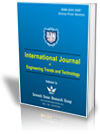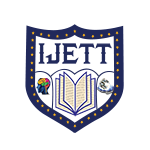A New Fast Iterative Decoder of Product Codes Based on Hash and Syndromes and Optimized by Genetic Algorithms
A New Fast Iterative Decoder of Product Codes Based on Hash and Syndromes and Optimized by Genetic Algorithms |
||
 |
 |
|
| © 2022 by IJETT Journal | ||
| Volume-70 Issue-12 |
||
| Year of Publication : 2022 | ||
| Author : Hamza Faham, Seddiq El Kasmi Alaoui, Mohammed El Assad, Saïd Nouh, Idriss Chana, Mohamed Azzouazi |
||
| DOI : 10.14445/22315381/IJETT-V70I12P227 | ||
How to Cite?
Hamza Faham, Seddiq El Kasmi Alaoui, Mohammed El Assad, Saïd Nouh, Idriss Chana, Mohamed Azzouazi, "A New Fast Iterative Decoder of Product Codes Based on Hash and Syndromes and Optimized by Genetic Algorithms," International Journal of Engineering Trends and Technology, vol. 70, no. 12, pp. 289-295, 2022. Crossref, https://doi.org/10.14445/22315381/IJETT-V70I12P227
Abstract
Iterative decoding techniques have become very interesting, motivated by the encouraging results of the turbo codes. The Soft Decision Decoder based on Hash Techniques (SDHT) is a recent decoder of best performances and low temporal complexity. It is this second characteristic of the speed of SDHT which prompted us to use it here as a component decoder. In this paper, we adopt then SDHT as a soft input hard output (SIHO) decoding algorithm, about implement an iterative decoder for product codes at the base of Quadratic Residue (QR) and Bose Ray-Chaudhuri and Hocquenghem (BCH) codes. To compute the SDHT soft output, we exploit extrinsic information according to Soleymani et al. The iterative decoding is achieved via Pyndiah’s connection layout. The major aim of using the SDHT decoder is to benefit from its low computational complexity. We have also used a genetic algorithm to optimize the confidence value Ф that yields good performance in terms of Bit-Error-Rate. Simulation results and the study of complexities show that the proposed iterative decoder exceeds some competitors in terms of performance and complexity.
Keywords
Error correcting codes, Genetic algorithms, Hash techniques, Product codes, Iterative decoder.
References
[1] Hamza Faham et al., “High Performance Decoding by Combination of the Hartmann Rudolph Decoder and Soft Decision Decoding by
Hash Techniques,” Lecture Notes in Networks and Systems, vol. 211, pp. 781–790, 2021. Crossref,
https://doi.org/10.1007/978-3-030-73882-2_71
[2] Hamza Faham et al., “An Efficient Combination between Berlekamp-Massey and Hartmann Rudolph Algorithms to Decode BCH
Codes,” Periodicals of Engineering and Natural Sciences, vol. 6, no. 2, 2018. Crossref, http://dx.doi.org/10.21533/pen.v6i2.540
[3] Hamza Faham et al., “New Way to Enumerate Large Quadratic Residue Codes Based on Hash and Automorphism Group,” Lecture
Notes in Networks and Systems, vol. 357, pp. 545–556, 2022. Crossref, https://doi.org/10.1007/978-3-030-91738-8_50
[4] Hamza Faham et al., “High Speed Decoding by Collaboration between the Hartmann Rudolph and Information Set Decoding
Algorithms,” Journal of Theoretical and Applied Information Technology, vol. 100, no. 17, pp. 5377–5385, 2022.
[5] C. Berrou, A. Glavieux, and P. Thitimajshima, “Near Shannon Limit Error Correcting Coding and Decoding: Turbo Codes,” IEEE
International Conference on Communications, ICC‖93, vol. 2, pp. 1064-1070, 1993. Crossref,
http://dx.doi.org/10.1109/ICC.1993.397441
[6] R.M. Pyndiah, “Near Optimum Decoding of Product Codes: Block Turbo Codes,” IEEE Transactions on Communications, vol. 46, no.
8, pp. 1003–1010, 1998. Crossref, http://dx.doi.org/10.1109/26.705396
[7] Yihan Jiang et al., “Turbo Autoencoder: Deep Learning Based Channel Codes for Point-To-Point Communication Channels,” Advances
in Neural Information Processing Systems, vol. 32, pp. 2758-2768, 2019.
[8] Natasa Zivic, and Obaid Ur-Rehman, “Iterative Self-Correction for Secured Images Using Turbo Codes and Soft Input Decryption,”
Journal of Intelligent & Fuzzy Systems, vol. 38, no. 2, pp. 1841-1854, 2020. Crossref, http://dx.doi.org/10.3233/JIFS-190234
[9] Lucian Trifina et al., “Upper Bounds on the Minimum Distance for Turbo Codes Using CPP Interleavers,” Telecommunication Systems,
vol. 76, no. 3, pp. 423-447, 2021. Crossref, https://doi.org/10.1007/s11235-020-00723-4
[10] Xiaowei Wu, Min Qiu, and Jinhong Yuan, “Partially Information Coupled Duo-Binary Turbo Codes,” In 2020 IEEE International
Symposium on Information Theory (ISIT), IEEE, pp. 461-466, 2020. Crossref, https://doi.org/10.1109/ISIT44484.2020.9174156
[11] Victoria Herranz, Diego Napp, and Carmen Perea, “1/n Turbo Codes from Linear System Point of View,” Magazine of the Royal
Academy of Exact, Physical and Natural Sciences. Series A. Mathematics, vol. 114, no. 3, pp. 1-16, 2020. Crossref,
https://doi.org/10.1007/s13398-020-00850-2
[12] Yihan Jiang et al., “Feedback Turbo Autoencoder,” IEEE International Conference on Acoustics, Speech and Signal Processing
(ICASSP), IEEE, pp. 8559-8563, 2020. Crossref, https://doi.org/10.1109/ICASSP40776.2020.9053254
[13] N. Le, A.R. Soleymani, and Y.R. Shayan, “Distance-Based-Decoding of Block Turbo Codes,” IEEE Communications Letters, vol. 9, no.
11, pp. 1005-1008, 2005. Crossref, https://doi.org/10.1109/LCOMM.2005.11014
[14] M E Purushoththaman, and Bhavani Buthtkuri, "Effective Multiple Verification Process Ensuring Security and Data Accuracy in Cloud
Environment Storage," SSRG International Journal of Computer Science and Engineering, vol. 6, no. 7, pp. 1-4, 2019. Crossref,
https://doi.org/10.14445/23488387/IJCSE-V6I7P101
[15] Idriss Chana, Hamid Allouch, and Mostafa Belkasmi, “New Turbo Decoding of Product Codes Based on Cyclic Codes,” Journal of
Telecommunications, vol. 11, no. 2, pp. 39-48, 2011.
[16] M.S. El Kasmi Alaoui, S. Nouh, and A. Marzak, “A Low Complexity Soft Decision Decoder for Linear Block Codes,” Proceedings of
the First International Conference on Intelligent Computing in Data Sciences, vol. 127, pp. 287-292, 2018. Crossref,
https://doi.org/10.1016/j.procs.2018.01.124
[17] Dasari Ramanna, and Ganesan V, "Design and Analysis of Improved Raptor Encoder-based Hybrid Recursive Systematic Convolutional
Encoding Technique for 6G Networks," SSRG International Journal of Electrical and Electronics Engineering, vol. 9, no. 11, pp. 11-16,
2022. Crossref, https://doi.org/10.14445/23488379/IJEEE-V9I11P102
[18] H. Maini et al., “Soft Decision Decoding of Linear Block Codes Using Genetic Algorithms,” Proceedings of IEEE International
Symposium on Information Theory, p. 397, 1994. Crossref, https://doi.org/10.1109/ISIT.1994.394622
[19] Latifa Mostari, and Abdelmalik Taleb-Ahmed, “Serial Concatenation of Binary LDPC Codes with Iterative Decoding,” International
Journal of Recent Engineering Science (IJRES), vol. 6, no. 6, pp. 7-10, 2019. Crossref,
https://doi.org/10.14445/23497157/IJRES-V6I6P102
[20] Faissal El Bouanani et al., “Comparison of Chase Decoders, OSD and those based on Genetic Algorithms,” Proceedings of Colloque
GRETSI, pp. 1153-1156, 2007.
[21] Korada Kishore Kumar, and Konni Srinivasa Rao, "An Efficient users Authentication and Secure Data Transmission of Cluster based
Wireless Sensor Network," SSRG International Journal of Computer Science and Engineering, vol. 5, no. 1, pp. 1-5, 2018. Crossref,
https://doi.org/10.14445/23488387/IJCSE-V5I1P101
[22] Moulay Seddiq El Kasmi Alaoui, Said Nouh, and Abdelaziz Marzak, “High Speed Soft Decision Decoding of Linear Codes Based on
Hash and Syndrome Decoding,” International Journal of Intelligent Engineering and Systems, vol. 12, no. 1, pp. 94-103, 2019.
Crossref, https://doi.org/10.22266/ijies2019.0228.10
[23] M.P.C. Fossorier, and S. Lin, “Soft Decision Decoding of Linear Block Codes Based on Ordered Statistics,” IEEE Transaction on
Information Theory, vol. 41, no. 5, pp. 1379–1396, 1995. Crossref, https://doi.org/10.1109/18.412683
[24] Ahmed Azouaoui, Mostafa Belkasmi, and Abderrazak Farchane, “Efficient Dual Domain Decoding of Linear Block Codes Using
Genetic Algorithms,” Journal of Electrical and Computer Engineering, vol. 2012, 2012. Crossref, https://doi.org/10.1155/2012/503834

